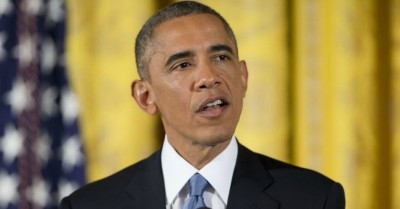Obama Ready to Talk with Congress About Official Approval for “Long-Term” War in Middle East

President Barack Obama speaks during a news conference in the East Room of the White House, on Wednesday, Nov. 5, 2014, in Washington. (Photo: AP/Pablo Martinez Monsivais)
With this year’s election now over and lawmakers relieved of the pressure that coincides with daily interaction with constituents, President Obama on Wednesday announced that he would finally ask Congress to give him the approval he needs to continue, and possibly expand, his new multi-front war against the militant group known as ISIS.
Military operations that began over three months ago in Iraq and the expanded to Syria in September have so far been conducted by authorities the Obama administration claims are contained in a pair of congressional military authorizations (AUMFs) signed during the Bush years that followed the attacks of September 11, 2001. Legal experts say those claims are dubious and others have pointed out that because the War Powers Act only allows the president to conduct overseas military operations without Congressional approval for 60 days, Obama is in violation of those restrictions.
“The idea is to right-size and update whatever authorization Congress provides to suit the current fight rather than previous fights,” the president said Wednesday. “We now have a different type of enemy; the strategy is different.”
And continued, “It makes sense for us to make sure that the authorization . . . reflects what we perceive to be not just our strategy over the next two or three months, but our strategy going forward.”
On Wednesday, however, in a press conference at the White House following Tuesday’s midterm elections, Obama said he was now prepared to seek the blessing of Congress for ongoing military action in Iraq and Syria, operations he has previously indicated could “long-term“—lasting many months or years into the future.
To Jason Ditz at Antiwar.com, the political timing of the president’s announcement seemed plain enough. He writes:
Most of the major party leaders on both sides of the aisle were pretty straightforward about their opposition to voting on the ISIS war before the Tuesday election. President Obama was fine with it at the time, insisting he didn’t need authorization.
Now that the election’s over, President Obama is changing his tune, and pushing for the lame duck Congress to quickly rubber stamp the conflict before the new one takes office.
However:
With the incoming Congress far more hawkish and doubtless to push a far more aggressive scope of the war, the president seems hopeful he can get the formality of a Congressional vote out of the way without them.
Legally, such a vote should’ve happened long ago, with the War Powers Act allowing the president only a 60 day window to seek authorization from Congress. If it had been held before the vote, the unpopularity of the conflict might’ve scared some off of backing it.
Now, with Congress outgoing and those returning to session years from having to face reelection, there’s likely to be much more stomach for pushing through a quick vote, and less serious debate.
In his comments on Wednesday, Obama indicated he wants to start the conversation with the current Congress but hinted that an agreement or vote may not happen until 2015, after the new Republican-controlled Congress was sworn in.
“It’ll be a process of listening to members of Congress, as well as us presenting what we think needs to be the set of authorities,” Obama said. “It may just be a process of us getting it started now. It may carry over into the next Congress.”

